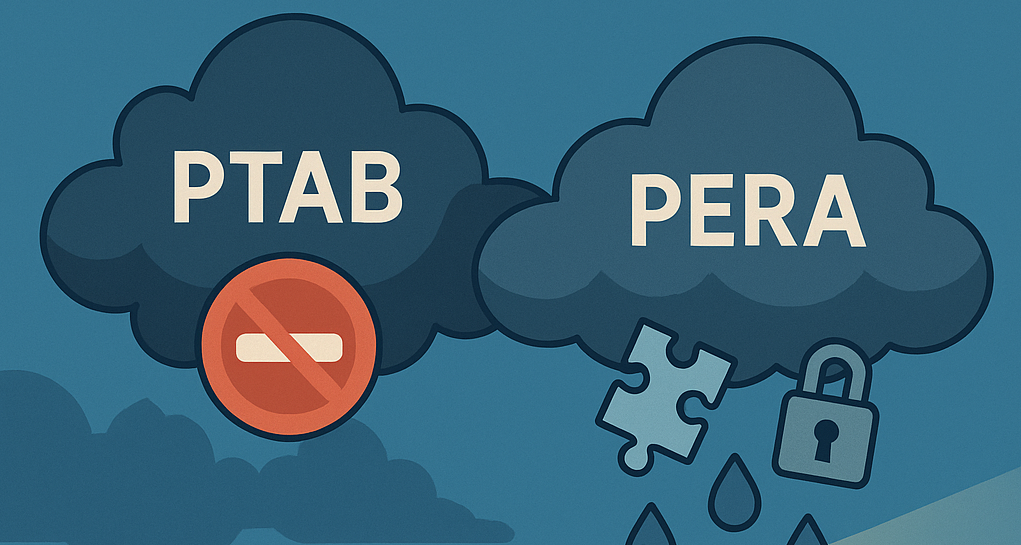A Perfect Storm Against Innovation: Why We’re Sounding the Alarm on a Dangerous Patent Bill
Alex Moss | October 8, 2025
In the world of innovation, especially in fast-moving fields like artificial intelligence, the rules of the road matter. They determine whether a startup with a brilliant idea can make it to market, or whether it will be roadblocked by a legal system stacked in favor of the powerful.
That’s why our coalition—representing software developers, startups, and the public interest—has sent a letter to the Senate Judiciary Committee urging them to reject the Patent Eligibility Restoration Act (PERA). This bill, combined with recent administrative changes, creates a “perfect storm” that threatens to stifle American innovation, competition, and economic dynamism.
The Two Pillars of a Healthy Innovation Ecosystem
For over a decade, a balanced approach has protected innovators from low-quality patents that can be weaponized to halt competition. This balance rested on two pillars:
The Patent Trial and Appeal Board (PTAB): Created by the bipartisan America Invents Act, the PTAB provided a faster, more affordable way to challenge weak patents that never should have been granted. It was a vital safety valve.
Section 101 of the Patent Act: This is the law that prevents the patenting of abstract ideas, natural phenomena, and fundamental principles. It ensures that no one can own the basic building blocks of science and computation—the equivalent of claiming a monopoly on the alphabet.
Together, these two pillars ensured that the patent system rewarded concrete, specific inventions, not vague ideas that would block entire fields and thwart future innovation.
How the Safety System Is Being Dismantled
The first pillar—the PTAB—is past its breaking point. Under new USPTO leadership, the rate of discretionary denials for PTAB challenges has skyrocketed. What was once a 15% denial rate has now jumped to 77%. This means that even meritorious challenges to low-quality patents are being blocked on procedural grounds before they can ever be heard on their merits. That means more bad patents that unfairly tax small businesses, independent creators, startups, and technology users.
For a small business, the PTAB was their one chance to defend themselves against a patent threat without going bankrupt in federal court. Now, they can’t even get on the field.
PERA: Pulling Out the Final Support Beam
It is in this precarious context that PERA proposes to gut the second pillar—Section 101. This is not a minor tweak. PERA would overturn centuries of settled law, from O’Reilly v. Morse in 1853 to the Alice decision in 2014. It would deliberately open the door to patents on abstract ideas, fundamental business practices, and mathematical concepts, merely by adding the words “on a computer.”
With the PTAB safety valve shut off and the eligibility guardrails torn down, the result would be a flood of low-quality patents. This creates a legal minefield where small businesses would face constant, crippling litigation simply for using fundamental programming techniques or business methods.
Why This Is Catastrophic for AI
This is especially dangerous for artificial intelligence. AI innovation is inherently cumulative; it builds on shared, fundamental building blocks like algorithms and mathematical models. Granting monopolies on these basic tools—the very thing PERA would allow—would force every AI startup to navigate a thicket of patents just to operate.
This acts as a massive tax on innovation, diverting precious capital from research and development to legal defense. In a field moving as fast as AI, a patent on an abstract concept is often obsolete by the time it’s granted, serving only to block competition, not promote progress.
The Path Forward: Restoration, Not Destruction
The path to U.S. leadership in AI and other critical technologies does not lie in granting more monopolies on ideas. It lies in promoting open competition and protecting our innovators from abusive litigation. And protecting the laws that have nourished American innovation throughout our nation’s history.
We urge Congress to oppose PERA and to focus instead on restoring the PTAB as the accessible, efficient check on patent quality that it was designed to be. We must protect the foundations of innovation, not auction them off to the highest bidder.
The letter was signed by the Electronic Frontier Foundation, Engine Advocacy, Public Interest Patent Law Institute, Public Knowledge, and the R Street Institute.
